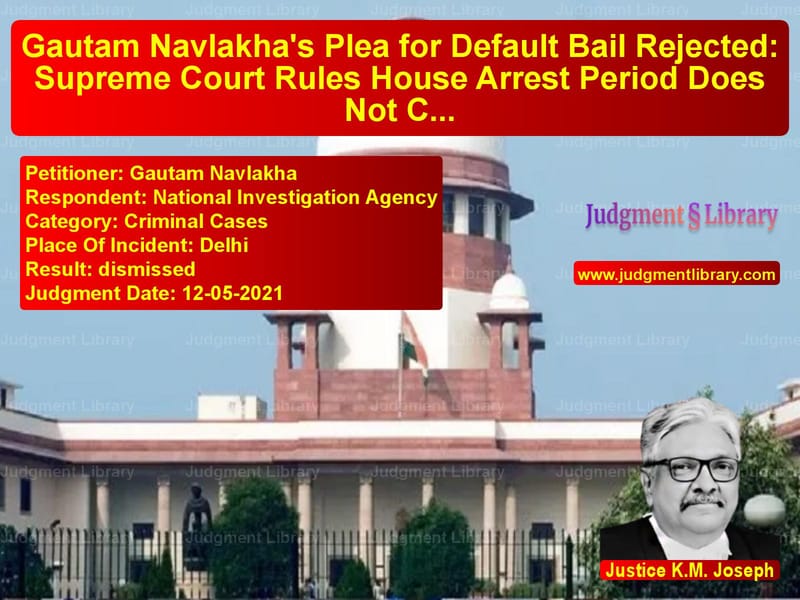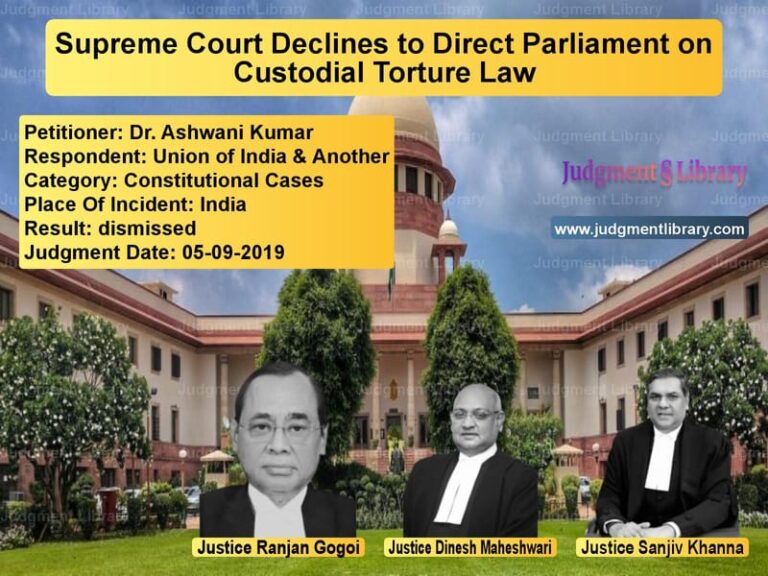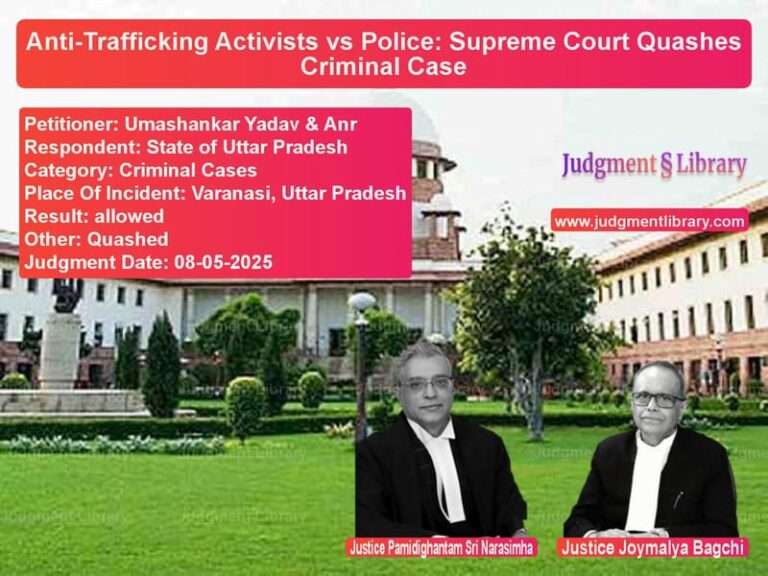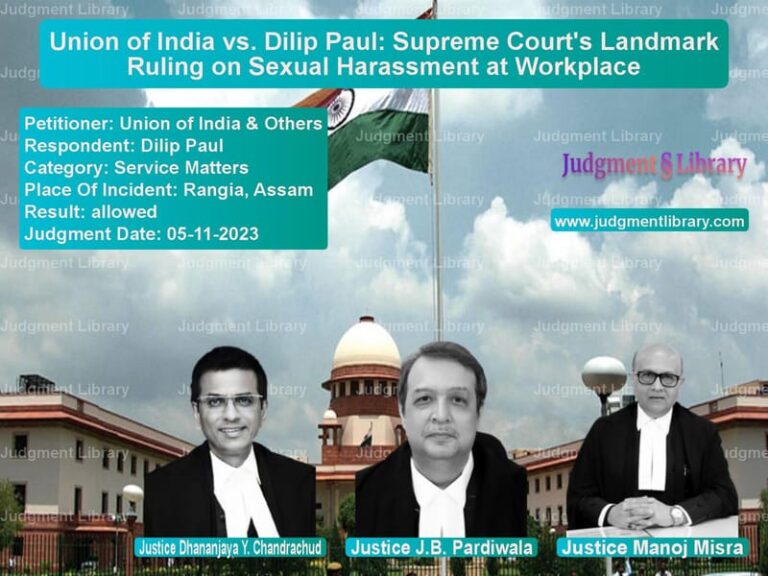Gautam Navlakha’s Plea for Default Bail Rejected: Supreme Court Rules House Arrest Period Does Not Count
The Supreme Court of India delivered a crucial verdict in the case of Gautam Navlakha, rejecting his plea for default bail under Section 167(2) of the Code of Criminal Procedure (CrPC). The case revolved around whether the period of house arrest could be counted as part of the mandatory 90-day period required for default bail.
Background of the Case
Gautam Navlakha was arrested in connection with FIR No. 4 of 2018, registered at Vishrambagh Police Station, Pune, Maharashtra. The FIR initially charged offenses under Sections 153A, 505(1B), and 34 of the Indian Penal Code (IPC). Later, Section 120(B) IPC and multiple provisions of the Unlawful Activities (Prevention) Act (UAPA) were added, making the case significantly more serious.
Navlakha was arrested on August 28, 2018, from his residence in Delhi. He immediately filed a writ petition in the Delhi High Court, seeking a writ of habeas corpus. The High Court issued an interim order preventing his transfer to Maharashtra and placed him under house arrest. The matter ultimately reached the Supreme Court, which extended his house arrest until further orders.
Arguments by the Petitioner
Navlakha’s counsel, Senior Advocate Kapil Sibal, argued:
- The period of house arrest from August 28, 2018, to October 1, 2018, should be included in the calculation of the 90-day period under Section 167(2) of CrPC.
- House arrest imposed by the court was akin to judicial custody, as Navlakha was not allowed to leave his premises or meet anyone except his lawyers.
- The High Court’s setting aside of his transit remand should not invalidate the period he spent under house arrest for the purpose of default bail.
- In several past cases, detention, even if later found illegal, was considered for calculating the statutory bail period.
Arguments by the Respondent
The National Investigation Agency (NIA), represented by Additional Solicitor General S.V. Raju, countered:
- The period of house arrest could not be counted, as Navlakha was not in police or judicial custody during this time.
- During house arrest, the investigating agency had no access to interrogate him, which is a key element of custody under Section 167.
- The Delhi High Court had declared his detention illegal, and once the house arrest ended, he was free to move and apply for anticipatory bail.
- Default bail applies only when the accused remains in authorized custody under the orders of a magistrate.
Supreme Court’s Observations
1. Nature of House Arrest
The Supreme Court examined whether house arrest qualified as police or judicial custody. It noted that:
- Custody under Section 167 refers to police or judicial custody.
- House arrest, in this case, was imposed by the High Court as an interim measure, not as a substitute for police or judicial custody.
- During house arrest, Navlakha was not interrogated, and the investigating agency had no control over him.
2. Impact of the Delhi High Court’s Order
The Supreme Court noted that the Delhi High Court had quashed Navlakha’s transit remand and declared his arrest illegal. The apex court held that:
- Once the detention was declared illegal, it could not be considered authorized custody for the purpose of Section 167.
- Counting such an invalidated period towards the statutory bail calculation would set a problematic precedent.
3. Legal Precedents
The court examined past cases and clarified that while periods of illegal detention have been considered in some situations, this case was different because:
- The order of house arrest was not issued under Section 167 but under the court’s writ jurisdiction.
- There was no police or judicial custody during the house arrest.
- Navlakha was granted the opportunity to apply for anticipatory bail after the house arrest ended, indicating his liberty was restored.
Final Verdict
The Supreme Court dismissed Navlakha’s plea for default bail, holding:
“The period of house arrest from August 28, 2018, to October 1, 2018, cannot be counted for the purpose of computing the mandatory 90-day period under Section 167(2) of CrPC. The detention was not under a magistrate’s order of remand and did not involve police or judicial custody.”
The court upheld the Bombay High Court’s ruling that Navlakha was not entitled to statutory bail.
Conclusion
This judgment clarifies the scope of default bail under Section 167(2) of CrPC and sets a significant precedent on the legal status of house arrest in criminal investigations. The Supreme Court reinforced that only authorized custody under a magistrate’s order counts towards the statutory bail period, ensuring a clear distinction between judicial, police custody, and other forms of detention.
Petitioner Name: Gautam Navlakha.Respondent Name: National Investigation Agency.Judgment By: Justice K.M. Joseph.Place Of Incident: Delhi.Judgment Date: 12-05-2021.
Don’t miss out on the full details! Download the complete judgment in PDF format below and gain valuable insights instantly!
Download Judgment: gautam-navlakha-vs-national-investigati-supreme-court-of-india-judgment-dated-12-05-2021.pdf
Directly Download Judgment: Directly download this Judgment
See all petitions in Bail and Anticipatory Bail
See all petitions in Judgment by K.M. Joseph
See all petitions in dismissed
See all petitions in supreme court of India judgments May 2021
See all petitions in 2021 judgments
See all posts in Criminal Cases Category
See all allowed petitions in Criminal Cases Category
See all Dismissed petitions in Criminal Cases Category
See all partially allowed petitions in Criminal Cases Category







